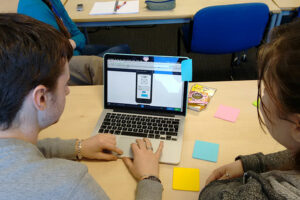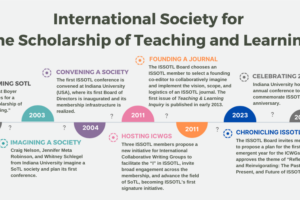Call for Applications: 2019 ISSOTL International Collaborative Writing Groups
- Posted by ISSOTL Admin
- Categories News
- Date January 18, 2019

Please consider applying for the following member opportunity to participate in an International Collaborative Writing Group (ICWG). Applications are due no later than March 15, 2019.
The ISSOTL ICWG initiative is a collaborative research and writing program that brings together scholars from around the world to work collectively on creating a SoTL publication. The program involves 2-3 days of face-to-face work immediately prior to the annual ISSOTL conference and includes remote collaborative work for several months both before and after this hands-on workshop. The ultimate goal for each group is to create a manuscript suitable for publication in Teaching and Learning Inquiry, the society’s SoTL journal.
The face-to-face portion of the third iteration of the ICWGs will be offered in 2019 from October 6-8, and will directly precede the ISSOTL conference (October 9-12) in Atlanta, Georgia, USA. We invite applications from teaching faculty/staff, administrators, and students who are members of ISSOTL. After receiving all applications, we will form ten teams of six members plus a facilitator. Each team will have at least one student member, and one group will be completely comprised of students.
The online application form has more information about costs and group topics.
If you have questions regarding the 2019 ICWG initiative, please contact one of the three group co-leaders:
Phillip Motley (pmotley@elon.edu)
Aysha Divan (a.divan@leeds.ac.uk)
Lauren Scharff (lauren.scharff@usafa.edu)
=========================================
Ten topics and group leaders
SoTL & STUDENT CONNECTIONS WITHIN THE CURRICULUM
Earle Abrahamson, University of East London, UK
Building upon published work, this topic explores how students make connections between the curriculum and learning communities in impactful ways. By expanding these dimensions, this group’s output would contribute to a deeper analysis of what a connected curriculum means by questioning, for example, how students connect with research; programme modules; across and between subjects and disciplines; with each other, across phases and with graduates.
THE SCHOLARSHIP OF FACILITATING CRITICAL REFLECTION
Bridget Arend, University of Denver, USA
Reflection is an intentional process of learning something from what we observe or what we do. Reflection is critical for many types of educational experiences, yet intentional scaffolding is needed to get beyond surface-level learning. This writing group will explore theories, studies and best practice from different disciplines, looking for common themes and necessary differences, with the goal of providing guidance for facilitating and structuring student reflection aimed towards meaningful learning.
*** STARTING OUT IN SoTL (Note that this topic is open to students only.)
Sam Lucie Dvorakova, University of Edinburgh, UK
SoTL is a diverse field composed of a plethora of topics, acronyms and interest groups. Starting out can often feel overwhelming to new researchers. In this ICWG we will trace the development of SoTL including some of the major emphases (e.g. the focus on students as partners). We will engage with current SoTL scholars (students and faculty) to bring together a series of frequently asked questions that incoming researchers may have.
MENTORING IN SoTL
Jennifer Friberg, Illinois State University, USA
SoTL provides the ideal context for mentorship as the focus of SoTL and mentoring is the sharing of knowledge to improve practice. Collaborative writing efforts for this group will focus on describing models of successful SoTL mentorship through case studies (with students, faculty, community, etc.) or descriptions of opportunities/applications for mentoring across the broad spectrum of SoTL inquiry (e.g., project development, dissemination, or peer review processes). Join us to explore this topic!
PEDAGOGIC PARTNERSHIP IN HIGHER EDUCATION: ENCOUNTERING EMOTION & ENHANCING WELL-BEING
Jennifer Hill, University of West England, UK
Higher education is experiencing increasing challenges around well-being. In this context, faculty, students and other stakeholders, working in partnership within and beyond the curriculum, have the potential to help students and staff work positively with their emotions and promote resilient academic behaviours and positive wellbeing. In this ICWG we will explore how pedagogic partnerships are being/might be developed to consciously enhance wellbeing in modern-day higher education communities.
INVESTIGATING BOUNDARY CROSSINGS WITHIN SoTL COLLABORATIONS
Barbara Kensington-Miller, University of Auckland, New Zealand
SoTL collaborations incorporate diversity, different knowledge and skills, and support development of thought and creativity. In this ICWG we will study collaborations as a process of boundary crossing to explore how participants make sense of the ways collaboration takes place within groups. Although many collaborations are successful, the process can be fraught. Recognising what hinders the process and questioning established ways can enable new ways to emerge to make boundary crossings within collaborations constructive.
THE SCHOLARSHIP OF TEACHING & NOT LEARNING
Karen Manarin, Mount Royal University, Canada
What would the Scholarship of Teaching and Not Learning look like? Does our desire to provide evidence of learning limit our understanding? What could we learn if we were willing to explore not learning? This ICWG explores these types of questions. We will decide together the direction of the work, for example, whether to write a conceptual essay about definitions of learning or to conduct interviews with SoTL scholars at various career stages about not learning.
THE SCHOLARSHIP OF CRITIQUE & POWER
T. Camille Martin and Gaia Scagnetti, Pratt Institute, USA
Examining the qualities that inform a critique and the methods used to give feedback in different fields, this ICWG will analyze the power dynamics inherent in this exchange and its pedagogical implications. If feedback methods underscore values, assumptions, and beliefs within a discipline, how do we eliminate cultural, ethnic, racial, or gender bias and issues of racial, class and gender discrimination? Is an imbalance of power in feedback an indispensable condition for learning?
BEST PRACTICES IN SHARING THE FINDINGS OF SoTL WITH STUDENTS
Trent Maurer, Georgia Southern University, USA
The focus of this ICWG will be on identifying, developing, and promoting best practices in sharing the findings and implications of SoTL with students themselves, with particular attention to including student voices and perspectives in the process. Although recent SoTL scholarship has focused on engaging students as meaningful partners in SoTL research, this specific element of partnership in dissemination has received comparatively little attention and is ripe for exploration.
TELLING OUR STORIES: PERSONAL NARRATIVES & SoTL
Heather Smith, University of Northern B.C., Canada
Let’s use this wonderful collaborative opportunity to explore the value of narrative and storytelling in the SoTL. We can start with where we all are, engage in collaborative research and find the ways to tell our stories and use our voices. Together we can reflect on the challenges of different perspectives on scholarship, unpack the ethics of the narrative approach, and explore the personal and scholarly implications of this approach.
You may also like

2024 Emerging Scholars Fund

Online Webinar | May 23, 2024


